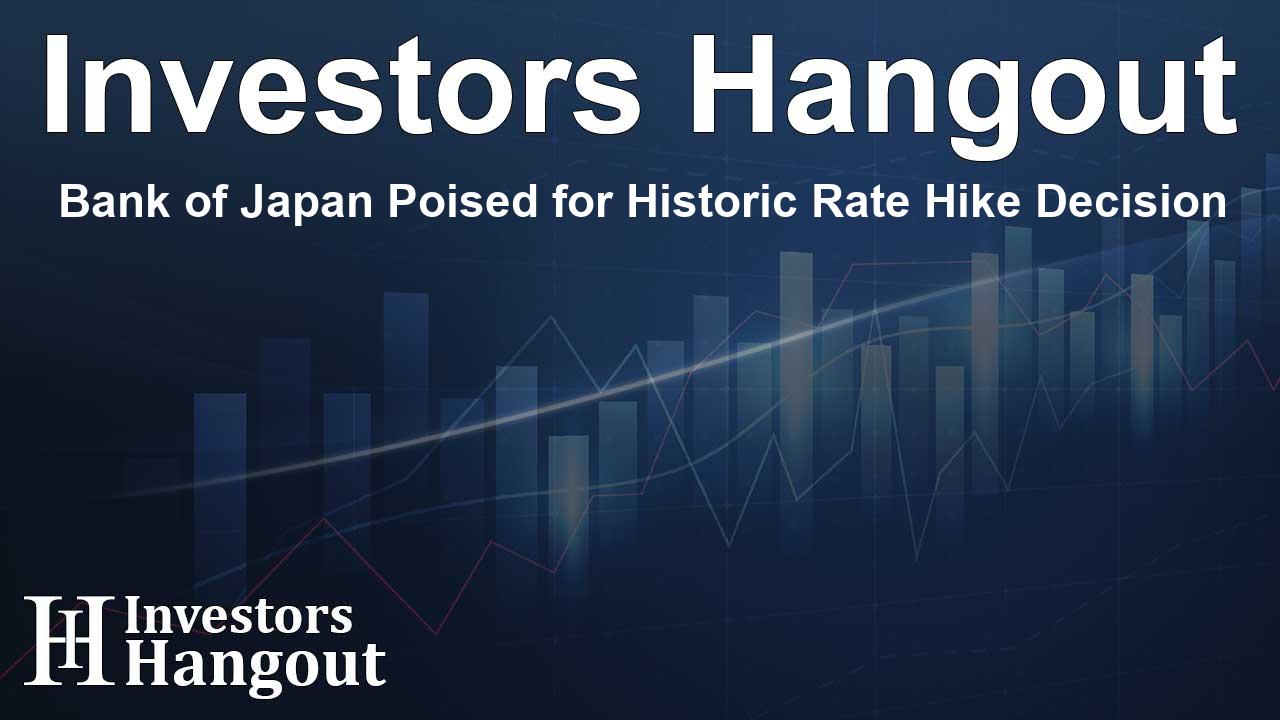Bank of Japan Poised for Historic Rate Hike Decision

Bank of Japan's Anticipated Rate Increase
The Bank of Japan (BOJ) is gearing up for a momentous decision regarding interest rates that has not occurred since the global financial crisis in 2008. With recent developments in the global markets, particularly a rally in stock prices, the central bank is poised to raise rates, reflecting a shift in economic conditions.
What the Rate Hike Means
Analysts predict that during its upcoming two-day meeting, the BOJ will elevate the short-term policy rate from 0.25% to 0.5%. This change, being the first increase in 17 years, signals a strong determination from the central bank to gradually approach the 1% mark, which many analysts believe is optimal for Japan's economy—neither stimulating excessive growth nor stifling it.
The Global Market Impact
In light of U.S. President Trump's inflammatory tariff threats, the market appeared to remain unfazed, which could influence the BOJ's decision to move forward with the rate hike. According to insights from Naomi Muguruma, chief bond strategist at Mitsubishi UFJ Securities, the BOJ is likely to proceed despite the political landscape in the U.S., which had previously caused turmoil in global markets.
Preparations for the Decision
Ahead of this significant meeting, BOJ leadership has communicated effective signals of a potential rate hike, thereby preparing the market and fostering a sense of confidence. The indication of a roughly 90% probability of a rate increase has caused a rebound in the yen.
Pricing Perspectives
Following the meeting, a quarterly outlook report from the BOJ is expected to raise price projections, highlighting the likelihood that wider wage increases will help sustain the bank's target inflation rate of 2%. With inflation rates surpassing expectations for nearly three years, and the effects of a weakened yen raising import costs, BOJ Governor Kazuo Ueda is likely to emphasize continued rate hikes in the near future.
The Path Forward for Interest Rates
Many experts in the financial field anticipate further increments in the central bank's rates by the end of the year, pending any unforeseen market disruptions. Mari Iwashita from Daiwa Securities suggests that following an increase to 0.5%, the BOJ could enact additional hikes at approximately six-month intervals, with the next possibility slated for September.
Political Factors at Play
The political calendar in Japan could also influence the timing of future rate hikes, as there is an upcoming upper house election. Some analysts believe that the performance of Prime Minister Shigeru Ishiba's coalition during this election may impact the BOJ's strategy moving forward.
Conclusion
Since assuming the leadership role in April 2023, Governor Ueda has initiated a significant shift in monetary policy by dismantling extensive stimulus measures and initiating modest interest rate hikes. By maintaining a focus on fostering an environment where rising inflation leads to wage increases, consumption growth may follow. This is essential for businesses to pass along higher costs, indicating a continual evolution in Japan's economic landscape.
Frequently Asked Questions
What is the expected rate hike from the Bank of Japan?
The BOJ is anticipated to raise its short-term policy rate from 0.25% to 0.5%, marking a significant change not seen in 17 years.
How has the global market affected the BOJ's decision?
The recent rally in global stock markets has influenced the BOJ to move forward with raising interest rates, despite potential challenges from international trade policies.
What is the significance of the 1% target?
Approaching the 1% interest rate is viewed as optimal for balance in Japan’s economy, facilitating stable growth without overheating or cooling it excessively.
What should we expect in terms of future rate hikes?
Analysts predict the BOJ may continue with rate increases roughly every six months, potentially implementing the next adjustment in September.
How does Japanese political dynamics affect the BOJ's strategy?
Political events, particularly upcoming elections, could play a crucial role in shaping the timing and extent of future rate increases by the BOJ.
About The Author
Contact Henry Turner privately here. Or send an email with ATTN: Henry Turner as the subject to contact@investorshangout.com.
About Investors Hangout
Investors Hangout is a leading online stock forum for financial discussion and learning, offering a wide range of free tools and resources. It draws in traders of all levels, who exchange market knowledge, investigate trading tactics, and keep an eye on industry developments in real time. Featuring financial articles, stock message boards, quotes, charts, company profiles, and live news updates. Through cooperative learning and a wealth of informational resources, it helps users from novices creating their first portfolios to experts honing their techniques. Join Investors Hangout today: https://investorshangout.com/
The content of this article is based on factual, publicly available information and does not represent legal, financial, or investment advice. Investors Hangout does not offer financial advice, and the author is not a licensed financial advisor. Consult a qualified advisor before making any financial or investment decisions based on this article. This article should not be considered advice to purchase, sell, or hold any securities or other investments. If any of the material provided here is inaccurate, please contact us for corrections.
